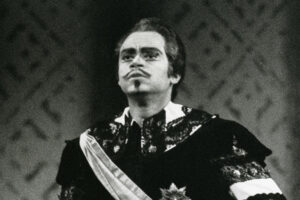

Instead of trying to repeat the winning formula, both Benjamin and Crimp have taken new paths in terms of narrative and musical structure. Once again, though, they arrived at the desired destination: a well rounded theatrical and musical experience which challenges he spectator and rewards him.
The King loves his wife and his children but is also involved in a gay love affair with Gaveston, opposed by the political adviser Mortimer and unleashing a chain of violent events. This story, based on the Elizabethan play Edward II by Christopher Marlowe, is told more straightforwardly in contrast to the symbolism in Written on Skin. It is, however, presented in a non-linear way with ellipses between the scenes (I wouldn’t call the scenes tableaux because they create a narrative coherence rather than being just snapshots.)
Benjamin’s music is bold. It creates an atmosphere for the play at the same time it breathe action. And there is still plenty of room for some moments of pure beauty like a neo-belcanto style, including some mezze di voce and nice consonant harmonies during ensemble singing. Orchestration is rich and wise, using a large array of instruments and colors not in unison but spreading the effects across the whole score, making it easier for the listener to grsp those textures while keeping up with the singing and the story.
The vocal writing uses brief verses with usually long notes or melismas at the middle or the end. These long notes give the singers the opportunity to empathize the expression. There is a bit of conservatism in the forms that, at the expense of the surprise, allows the listener to guess if not what is coming next at least how is it coming.
Writing a new opera with specific singers in mind gives the composer the opportunity to take advantage of the best qualities of those singers. Stéphane Degout as the King sings with notable clarity and is able to portray all the emotions required by his character through his phrasing: desperate love while singing to Gaveston, confusion when answering to Mortimer, and so forth…
Gaveston is sung by Gyula Orendt in firm voice, making him credible as a brutal man. Peter Hoare‘s bright tenor voice fits well Mortimer’s character, antagonizing the lovers by singing like an action man, faster, with urgency.
Barbara Hannigan as the Queen Isabel representing her beauty with a beautiful toned voice and her desolation as a woman who is losing her husband with a range of incisive and warm sustained high notes. Special mention should be made of Samuel Boden, whose high tenor voice was just right for the Young King role. He sang it with an astonishing credibility.
The production is directed by Katie Mitchell, who did also the original Written on Skin. She takes the story to modern times and adds context to what is said in the libretto: bureaucrats and politicians around the action, servants bringing the crown or Francis Bacon paintings in the dorm.( There are also some of her trademarks like closed spaces and slow-motion movements.)
At the end of the night we got an interesting story and beautiful music told and sung with ideally suited actors and singers, prompting us to reflect on love, politics and violence. What else is opera supposed to do?
Photo: Stephen Cummiskey
























Comments